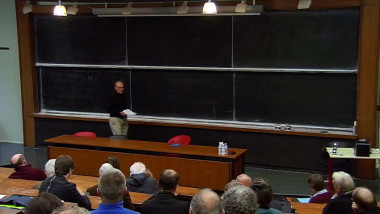Finiteness for self-dual classes in variations of Hodge structure
Appears in collection : Géométrie algébrique en l'honneur de Claire Voisin
I will talk about a new finiteness theorem for variations of Hodge structure. It is a generalization of the Cattani-Deligne-Kaplan theorem from Hodge classes to so-called self-dual (and anti-self-dual) classes. For example, among integral cohomology classes of degree 4, those of type (4,0) + (2,2) + (0,4) are self-dual, and those of type (3,1) + (1,3) are anti-self-dual. The result is suggested by considerations in theoretical physics, and the proof uses o-minimality and the definability of period mappings. This is joint work with Benjamin Bakker, Thomas Grimm, and Jacob Tsimerman.












